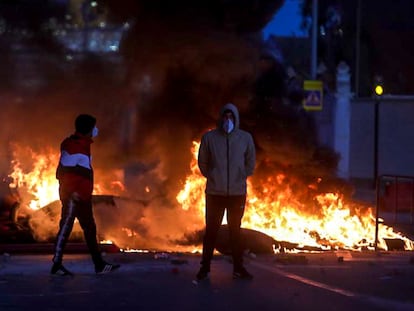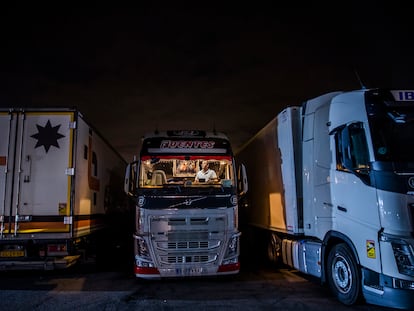The faces behind the ongoing metalworker protests in Spain’s southern city of Cádiz
EL PAÍS speaks to a student, a father, a 30-year-old who can’t afford to leave the family home and an aeronautics worker to find out why they are demonstrating

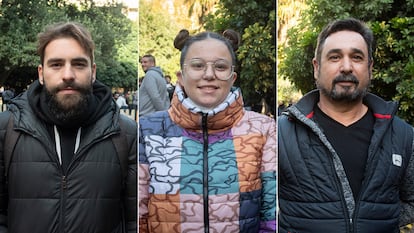
Fourteen years ago, the then-mayor of Cádiz, Teófila Martínez of the conservative Popular Party (PP), came up with a slogan meant to attract tourists: The city that smiles. Although it helped, it wasn’t just this campaign that created the stereotypical image of the Andalusian city as a place full of witty folks able to laugh off their financial difficulties through ironic songs that compete for prizes during Cádiz’s famous Carnival.
But the recent street strikes by metalworkers demanding wage increases in line with inflation have uncovered a more accurate and uncomfortable reality. Not everyone in Cádiz – perhaps not even a majority – really feels like laughing right now. Especially not when the unemployment rate is over 23% and the city continues to lead national statistics in terms of poverty and job insecurity. In Cádiz, workers across all industries are suffering from outsourcing, plant closures and a cyclical lack of jobs in the powerful naval sector.
There is nothing new about the metal sector’s protests. Every recent generation has its own memories of the struggle, even people who do not work directly in this field. There have been recurring protests by metalworkers since the 1970s, but the one taking place right now is set against a broader wave of discontent sweeping the entire country due to the rising cost of living and, for the self-employed, of running a business.
Cádiz’s metalworkers have been staging street protests for weeks, erecting barricades and occasionally setting cars on fire. The recent use of a military armored vehicle by riot police caused an outcry on social media and the incident created tension within Spain’s governing coalition, with Labor Minister Yolanda Díaz, of the leftist Unidas Podemos, asking Interior Minister Fernando Grande-Marlaska of the Socialist Party (PSOE) to make sure the police do not use this vehicle again. “The workers of Cádiz are not criminals, they are defending their rights,” said Díaz on Tuesday. “I urge absolute respect for demonstrators in a province that is suffering from unemployment and despair.”
Several protesters from different backgrounds talked to EL PAÍS about the reasons that have pushed them to march on the streets.
Minerva and Antonio Morgado: “We are fighters”
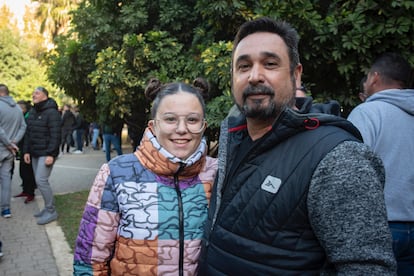
Minerva Morgado, 18, has been participating in the protests ever since she found out that the student union was calling a strike on November 17. On that day she marched on the streets alongside her father Antonio, a factory worker at a paint company that does work for the naval industry. “I don’t understand why they want to take away their pay,” said Minerva, who is studying to become a hairdresser. This young woman is angry on two fronts: her father’s situation and the value-added tax (IVA) affecting hair salons, whose owners are also staging their own protests across Spain.
The Morgado family moved to Cádiz from the nearby province of Huelva five years ago. Antonio’s wife is out of a job after working in the services sector, which means that the family’s only income is the father’s monthly check of €1,200, with whatever else he makes from putting in extra hours. “I practically live at the shipyard, doing up to 120 extra hours a month in order to earn €2,100,” said the 47-year-old. “I never see my daughter, and I only see my wife because I sleep next to her.”
Antonio said he knows what’s going to happen next, because he’s seen it before. “The collective bargaining agreement will be signed, but not honored,” he said. “We are fighters, we need to pull out of this. But when we sign this, it will all be over.”
Lola: “The people of Cádiz support us because they’ve been through this”
Lola, 52, began her career as a clerical worker at the car parts supplier Delphi, and now she works for a company in the aeronautics industry. Lola is an assumed name: she declined to give her real name, or the name of her company, or to have her picture taken, out of fear of reprisals at work. And she was not the only interviewee to react this way.
Lola is one of the 2,000 workers who were sacked from Delphi when it went bankrupt in 2007, an event that few people around here have forgotten. That is why she believes that people are sympathetic to the current street demonstrations. “The media are covering this because of the altercations, otherwise...” she trailed off. “The people of Cádiz are supportive because they’ve been through this too many times before.”
Lola has seven siblings. Four moved away in search of jobs, one has a teaching position at a public school and another one is employed at a workshop where strikes have also been called.
She brings home €1,300 after tax, while her husband, a metalworker, earns a similar amount. Lola is aware that hers is not a very high salary considering her age, and that is why she is no longer willing to yield. At the last negotiations, company representatives said they would backtrack on planned cuts, but Lola will not stop striking until the documents are signed – even though this means losing €180 for each of the days that she is not working. So far that’s nine days. “I was thinking about that the other day,” she said. “But it’s better not to.”
Manuel Posada: “I harbor the hope that people will stand up for their rights”
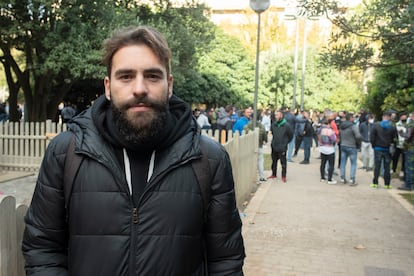
Manuel Posada, 30, grew up around the aeronautics sector, where his father used to work as well. He thought he was doing the right thing when he took a vocational training course in metal machining, which led to a job in the industry.
But now he’s not so sure about his career choice. “The metal sector is going from bad to worse with every passing day, I can see that, but what do we do? Go work at a bar or a hotel? People don’t want those jobs because they are not well paid,” he said. Posada has been with his company for six years, and only recently was offered a permanent contract. He earns a little over €1,000 after tax, nearly €250 less than some of his colleagues because his contract is newer and tied to a collective bargaining agreement with less favorable conditions.
“I am single and childless, and trying to move out of the family home, but with this salary and with apartment rental prices at €650 – and that’s for real dumps – where can I go?” he wondered.
Posada feels that people his age will relate to his own problems, even if they work in different sectors. “I harbor the hope that people will stand up for their rights and show the will to fight,” he said. “It’s needed right now, but let’s see what happens.”
Tu suscripción se está usando en otro dispositivo
¿Quieres añadir otro usuario a tu suscripción?
Si continúas leyendo en este dispositivo, no se podrá leer en el otro.
FlechaTu suscripción se está usando en otro dispositivo y solo puedes acceder a EL PAÍS desde un dispositivo a la vez.
Si quieres compartir tu cuenta, cambia tu suscripción a la modalidad Premium, así podrás añadir otro usuario. Cada uno accederá con su propia cuenta de email, lo que os permitirá personalizar vuestra experiencia en EL PAÍS.
¿Tienes una suscripción de empresa? Accede aquí para contratar más cuentas.
En el caso de no saber quién está usando tu cuenta, te recomendamos cambiar tu contraseña aquí.
Si decides continuar compartiendo tu cuenta, este mensaje se mostrará en tu dispositivo y en el de la otra persona que está usando tu cuenta de forma indefinida, afectando a tu experiencia de lectura. Puedes consultar aquí los términos y condiciones de la suscripción digital.
